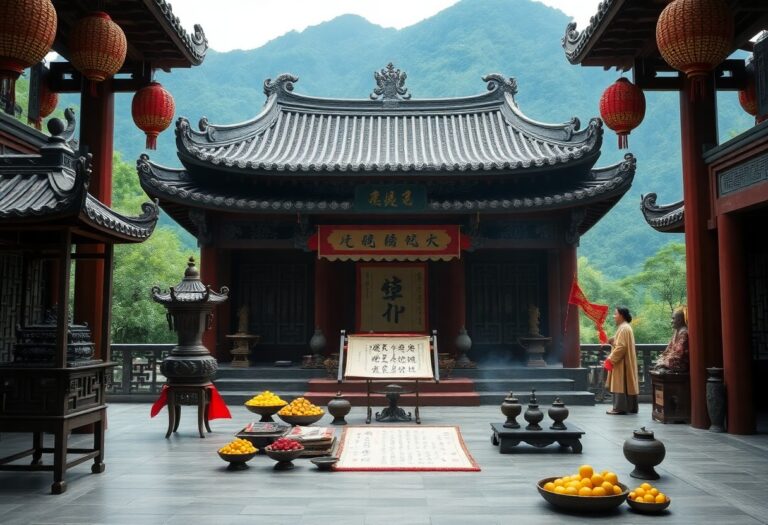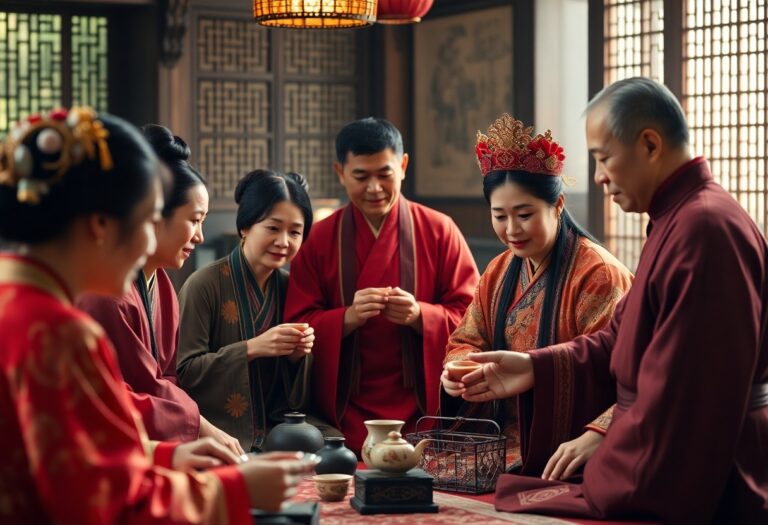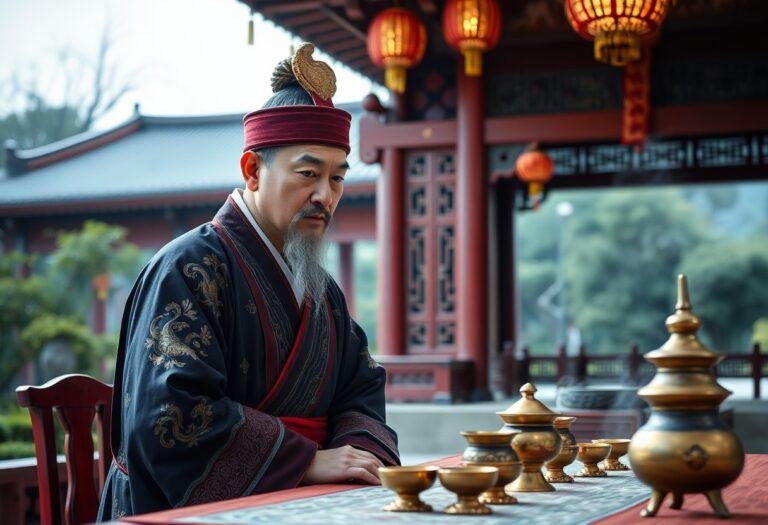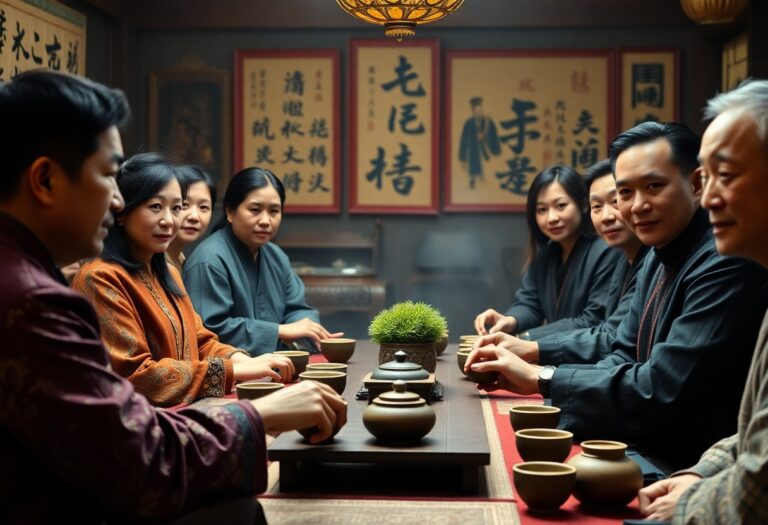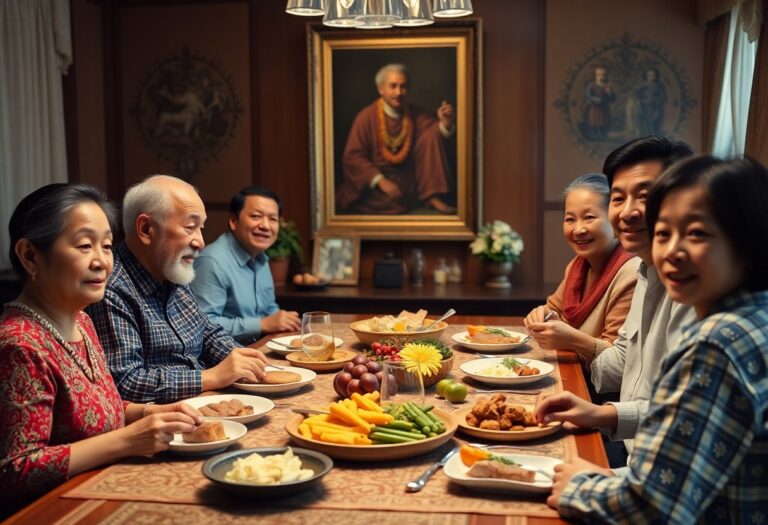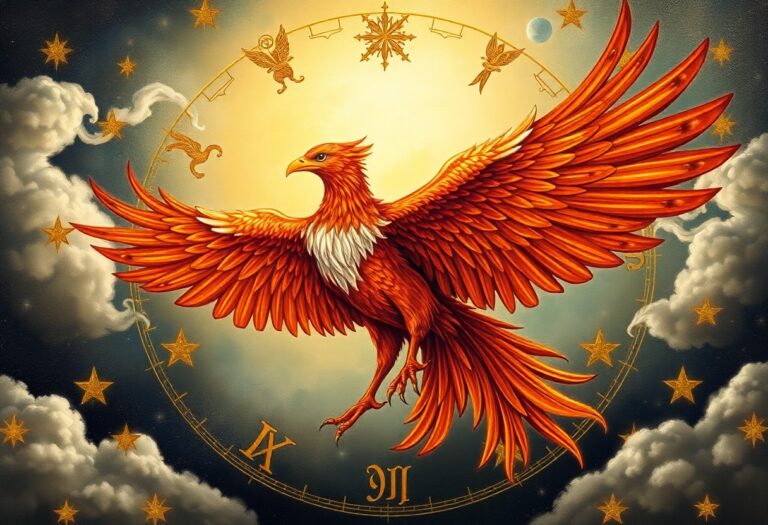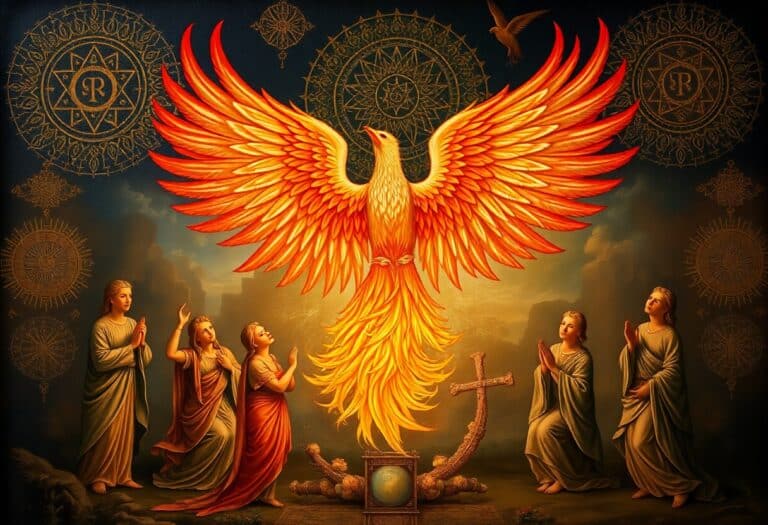The Legend of Sun Wukong: The Monkey King in Chinese Mythology
The tale of Sun Wukong, known as the Monkey King, is a cornerstone of Chinese mythology, captivating audiences since the 16th century. His adventures are chronicled in the famous novel “Journey to the West,” a story that intertwines themes of rebellion, adventure, and immortality. This legendary figure, often seen as a symbol of cleverness and mischief, embodies the rich tapestry of Chinese cultural values and philosophical ideals. As we delve into the origins and significance of the Monkey King, we uncover a narrative that has influenced countless adaptations, including popular anime and modern storytelling.

Introduction to Sun Wukong
Sun Wukong, also celebrated as the Monkey King, has a storied past that begins in the pages of the 16th-century Chinese novel “Journey to the West.” The character's name, Sūn Wùkōng, translates to “Monkey Awakened to the Void,” reflecting his unique beginnings. Born from a magical rock on Flower-Fruit Mountain, he emerged as a fully formed being capable of speech and extraordinary abilities. His essence draws from various mythological inspirations, including Wuzhiqi, a notable ape-like figure in Chinese folklore, and the Hindu deity Hanuman. The exploits of Sun Wukong have secured him a permanent place in the annals of Chinese culture and mythology.
The Origins of the Monkey King
The origins of Sun Wukong are as fascinating as the character himself. According to “Journey to the West,” he was born from a stone egg that emerged from a magical rock, a symbol of transformation and rebirth. After his birth, Sun Wukong quickly proved his mettle by discovering a hidden cave behind a waterfall, earning him the title of king among the monkeys. His early life was marked by a rebellious spirit and an insatiable thirst for adventure, propelling him toward the pursuit of immortality. His journey led him to train under a Taoist monk, where he acquired numerous magical abilities, including the legendary 72 Transformations that enabled him to shapeshift into various beings, solidifying his status as the Great Sage, equal to Heaven.
Sun Wukong's Birth and Early Life
Sun Wukong's birth and early life are integral to understanding his character. The stone egg from which he originated is a testament to the mystical elements of Chinese mythology. After establishing himself as the king of the monkeys, his adventurous spirit drove him to seek out immortality, which led to numerous encounters with celestial beings. Notably, his desire for power and recognition resulted in a confrontation with the Jade Emperor. Wukong’s rebellious nature and willingness to challenge the celestial order underscore the themes of autonomy and self-discovery prevalent in his story. As he trained under his mentor, he honed his skills and prepared himself for future challenges that would test his resolve and abilities.
The Significance of the Monkey in Chinese Culture
In Chinese culture, the monkey is a potent symbol of cleverness, mischief, and adaptability. These traits are vividly embodied by Sun Wukong, the Monkey King, whose character has transcended generations. His journey reflects themes of rebellion against authority and the quest for freedom, resonating deeply with cultural values. The Monkey King's story is not just an adventure but a narrative of self-discovery and enlightenment, mirroring the philosophical ideals of perseverance and transformation central to Chinese thought. Additionally, the legacy of Sun Wukong has influenced various adaptations, including the character Son Goku in the popular “Dragon Ball” anime, showcasing the enduring impact of this legendary figure on global pop culture.
The Journey to Immortality
Sun Wukong's Quest for Power
Sun Wukong's quest for immortality is a central theme in “Journey to the West.” His journey begins with a fervent desire to transcend death, compelling him to challenge the celestial hierarchy. Eager to acquire power, he seeks various methods to achieve immortality, including rigorous training under a Taoist master and the consumption of magical peaches from the Heavenly Peach Garden. This defiance against the Jade Emperor and other celestial beings showcases Sun Wukong's rebellious spirit. His determination reflects a broader struggle for autonomy against oppressive forces, setting the stage for his evolution from a mere stone monkey to the Great Sage, equal to Heaven.
Encounters with Deities and Demons
Throughout his adventurous saga, Sun Wukong encounters a myriad of deities and demons, forging alliances and facing adversaries along the way. His confrontations with powerful figures like the Jade Emperor and Erlang Shen highlight not only his formidable strength but also his cunning intellect. Wukong's ability to outsmart celestial beings and demons illustrates his resourcefulness, allowing him to navigate the complexities of the supernatural realm. These encounters serve as pivotal lessons in humility and the importance of cooperation, as he learns to balance his immense power with the responsibilities it entails. Through these trials, Wukong's character deepens, showcasing growth while emphasizing that true strength lies in unity and understanding.
The Secrets of Immortality: Techniques and Trials
Sun Wukong's relentless pursuit of immortality involves mastering intricate techniques and enduring formidable trials. Under the guidance of his master, Bodhi, he learns the secret formula for immortality and acquires the extraordinary ability to transform into 72 different forms. His journey is marked by significant challenges, including a period of imprisonment under a mountain for 500 years, which serves as a crucial period of reflection and personal growth. Ultimately, these experiences culminate in Wukong attaining Buddhahood, granting him eternal life and profound wisdom. This transformation exemplifies the essence of his journey, where the quest for power evolves into a deeper understanding of existence and enlightenment, solidifying his legacy as a pivotal figure in both Chinese mythology and the narrative of self-discovery.
The Story of Sun Wukong in Literature
Journey to the West: The Epic Tale
“Journey to the West,” attributed to Wu Cheng'en, is a foundational text in Chinese literature that chronicles the adventures of the monk Tang Sanzang and his three disciples, including Sun Wukong. The novel blends elements of fantasy, folklore, and religious philosophy, presenting a rich narrative that explores themes of redemption, loyalty, and enlightenment. Sun Wukong's character evolves throughout the story, transitioning from a rebellious trickster to a loyal protector of Tang Sanzang, ultimately achieving spiritual enlightenment. His journey not only highlights his formidable abilities as the Great Sage, equal to Heaven, but also serves as a profound exploration of the human experience, illustrating the complexities of ambition and purpose.
Major Themes and Lessons in the Legend
The legend of Sun Wukong encompasses several major themes, including the quest for self-improvement, the struggle against tyranny, and the importance of companionship. Wukong's journey reflects the human experience of overcoming obstacles and seeking personal growth, embodying the essence of perseverance. His relationship with Tang Sanzang emphasizes the value of mentorship and the significance of guidance in achieving one's goals. The narrative also critiques the nature of power and authority, encouraging readers to question societal norms and pursue their own paths. Through his trials, from facing the Jade Emperor to battling demons like the Bull Demon King, Wukong is revealed as a character who embodies resilience and the pursuit of enlightenment, ultimately teaching valuable lessons in humility and strength.
Adaptations and Cultural Impact
Sun Wukong's character has transcended literature, inspiring countless adaptations in film, television, and video games. The story of “Journey to the West” has been retold in various forms, from animated series to live-action films, making it accessible to diverse audiences worldwide. The character has also influenced popular culture, inspiring characters like Son Goku from the “Dragon Ball” series. Sun Wukong's legacy continues to thrive as new adaptations keep the spirit of the Monkey King alive for future generations. This enduring presence in both Eastern and Western cultures illustrates the universal appeal of Wukong's adventures, showcasing themes that resonate with audiences, such as the quest for immortality and the importance of friendship in the face of adversity.
Character Traits of the Monkey King
Bravery and Rebellion
Sun Wukong is characterized by his bravery and rebellious nature. His willingness to challenge authority figures, such as the Jade Emperor, showcases his fearless spirit. Throughout “Journey to the West,” Wukong's courage is evident in his numerous battles against demons and celestial beings, where he often relies on his quick thinking and combat skills. His defiance against oppressive forces resonates with themes of individualism and the quest for freedom, making him a relatable and inspiring figure. This relentless pursuit of autonomy positions Wukong as not only a formidable warrior but also a symbol of resilience, encouraging others to confront their own challenges with similar tenacity.
Trickery and Intelligence
As a trickster character, Sun Wukong embodies cleverness and resourcefulness. His ability to outsmart opponents and navigate complex situations demonstrates his intelligence. He often employs cunning tactics to overcome challenges, using his magical transformations and combat skills to gain the upper hand. This aspect of his character highlights the importance of wit and strategy in achieving success, reflecting the broader cultural appreciation for cleverness in Chinese folklore. Wukong's use of the 72 transformations showcases his versatility, allowing him to adapt to various circumstances and outmaneuver those who underestimate his capabilities, solidifying his place as a brilliant tactician in the myth of Sun Wukong.
Friendship and Loyalty
Despite his rebellious nature, Sun Wukong ultimately values friendship and loyalty. His bond with Monk Tang Sanzang and the other disciples illustrates his capacity for growth and change. Throughout their journey, Wukong learns the significance of teamwork and the strength that comes from supporting one another. His transformation from a self-centered trickster to a devoted protector emphasizes the importance of relationships and the impact they have on personal development. This evolution not only enriches Wukong’s character but also serves as a reminder of the power of camaraderie in overcoming adversity, making the Monkey King a multifaceted figure in the story of Sun Wukong.
Conclusion: The Legacy of Sun Wukong
Enduring Popularity in Modern Culture
Sun Wukong's legacy remains strong in modern culture, with his character continuing to capture the imagination of audiences worldwide. His story has been adapted into various forms of media, including films, television series, and video games, ensuring that the Monkey King's adventures reach new generations. The character's themes of rebellion, self-discovery, and friendship resonate with contemporary audiences, allowing him to remain a beloved figure in popular culture. This ongoing adaptation, from the original 16th-century Chinese novel “Journey to the West” to modern anime like “Dragon Ball,” highlights how Wukong’s essence transcends time, illustrating the timeless nature of his journey and struggles.
Symbolism of the Monkey King Today
Today, Sun Wukong symbolizes the struggle for freedom and individuality. His character embodies the qualities of resilience, cleverness, and loyalty, making him a relatable and inspiring figure for many. The Monkey King's journey reflects the universal human experience of overcoming obstacles and seeking personal growth. As a cultural icon, Sun Wukong serves as a reminder of the importance of questioning authority and pursuing one's own path. This symbolic representation encourages individuals to embrace their uniqueness and combat the constraints imposed by society, reinforcing the relevance of Wukong's story in the context of contemporary issues.
Final Thoughts on the Legend of Sun Wukong
The legend of Sun Wukong, the Monkey King, is a rich tapestry of adventure, wisdom, and self-discovery. His character has left an indelible mark on literature and culture, inspiring countless adaptations and interpretations. As a symbol of rebellion and resilience, Sun Wukong continues to resonate with audiences, reminding us of the power of courage, friendship, and the pursuit of enlightenment in our own lives. The enduring nature of his story, filled with trials, triumphs, and teachings, ensures that the legacy of the Monkey King will inspire future generations, making the myth of Sun Wukong a timeless and ever-relevant narrative in the world of storytelling.
Q: Who is Sun Wukong in Chinese mythology?
A: Sun Wukong, also known as the Monkey King, is a legendary figure in Chinese mythology, known for his remarkable strength, agility, and magical abilities. He is considered one of the central characters in the classic novel “Journey to the West.”
Q: What are some of the powers that Sun Wukong possesses?
A: Sun Wukong possesses many extraordinary powers, including the ability to transform into various forms, immortality, and superhuman strength. He also acquires the 72 transformations, which allow him to change his shape at will.
Q: What is the significance of Mount Huaguo in the story of Sun Wukong?
A: Mount Huaguo is considered the birthplace of Sun Wukong and is where he first discovers his powers. It serves as the home of the monkey tribe that he protects and rules over.
Q: What relationship does Sun Wukong have with the Jade Emperor?
A: The Jade Emperor's court appoints Sun Wukong to a low-ranking job in heaven, which leads to his rebellion against the authority of heaven. This conflict is central to his character development in the myths.
Q: How does Sun Wukong's character relate to the concept of black myth?
A: Sun Wukong has been the subject of various interpretations, including black myth, where he embodies traits that challenge traditional moral boundaries, showcasing his rebellious nature against the celestial order.
Q: What role does the Dragon King play in Sun Wukong's adventures?
A: The Dragon King is a significant figure who provides Sun Wukong with magical weapons, including the Ruyi Jingu, which is a powerful staff that can change size according to Wukong's will.
Q: What is the “Book of Life and Death” in relation to Sun Wukong?
A: In the tales, the “Book of Life and Death” is a mystical book that records the fates of all beings. Sun Wukong's interactions with it highlight his struggle for immortality and defiance against fate.
Q: How does Sun Wukong's relationship with the Sun and Moon reflect his character?
A: The duality of Sun and Moon symbolizes Sun Wukong's complexity—his bright, mischievous spirit juxtaposed with darker, rebellious traits, illustrating his journey from chaos to enlightenment.
Q: Can you explain the significance of the phrase “Wukong eats a gourd”?
A: “Wukong eats a gourd” is a reference to a moment in the tales where he consumes a magical gourd, symbolizing his ability to absorb knowledge and power, further enhancing his already impressive abilities.
Q: What does it mean when it's said that “Wukong demands to see” the Buddha?
A: When Wukong demands to see the Buddha, it signifies his quest for ultimate truth and understanding, representing the struggle between his pride and the pursuit of enlightenment in the face of divine authority.
